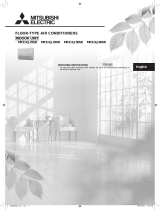Es-19
● MANUAL DE INSTRUCCIONES ●
Incluso si se comprueban estos objetos, cuando la unidad no se recu-
pera de un problema, deje de utilizar el aparato de aire acondicionado y
consulte con su distribuidor.
Síntoma
Explicación y puntos de comprobación
Unidad Interior
La unidad no puede ponerse
en funcionamiento.
• ¿Está encendido el interruptor?
• ¿Está conectado el enchufe?
• ¿Está puesto el temporizador ON?
Página 17
La paleta horizontal no se
mueve.
• ¿La paleta horizontal está instalada
correctamente?
•
¿La protección del ventilador está deformada?
No se puede operar con la
unidad durante 3 minutos
cuando se reinicia.
• Esto protege la unidad según las instruc-
ciones del microprocesador. Por favor,
espere.
El ventilador se para durante
la operación DRY.
<SÓLO DE TIPO MS>
• En la operación DRY, la unidad funciona uti-
lizando el mismo circuito de refrigerante que
en la operación COOL. El tiempo de opera-
ción DRY se ha de reducir para disminuir la
humedad sin demasiada disminución de la
temperatura en la habitación. Por lo que el
compresora veces se para, al mismo tiempo
que se para el ventilador interior. Esto evita
que el agua condensada en el intercambia-
dor de calor se evapore de nuevo.
El vapor se descarga a través
de la salida de aire de
la unidad interior.
• El aire frío de la unidad enfría rápidamente la
humedad en el aire dentro de la habitación
y se convierte en bruma.
La operación de balanceo
de la VANE HORIZONTAL /
VERTICAL se suspende du-
rante un instante, y después
se reanuda.
• Esta es una operación que se ejecuta
normalmente en la operación de balanceo
HORIZONTAL / VERTICAL VANE.
La dirección del flujo de
aire cambia en pleno
funcionamiento.
La dirección del deflector
horizontal no puede ajustarse
con el controlador remoto.
• Cuando se opera la unidad en modo COOL o
DRY, si la operación continúa con aire hacia
abajo durante de 0,5 a 1 hora, la dirección
del flujo de aire se fija automáticamente en
la posición (1) para evitar que el agua se
condense y gotee.
La unidad inicia su operación
por si sola cuando se conecta
la corriente principal, a pesar
de que no se encienda con el
mando a distancia.
• Estos modelos están equipados con una
función de reinicio automática. Cuando se
apaga la corriente principal sin apagar la
unidad con el mando a distancia y se encien-
de de nuevo, la unidad inicia su operación
automáticamente del mismo modo que con
el mando a distancia justo antes de apagar
la corriente principal. Consulte la Página 15
“Función de reinicio automático”.
Unidad Exterior
En la unidad exterior hay
una fuga de agua.
• Durante la REFRIGERACIÓN o la DESHU-
MIDIFICACIÓN, el enfriamiento de los tubos
y de las conexiones de los tubos hace que
se condense el agua.
El ventilador de la unidad
exterior no gira aunque el
compresor está funcionando.
Aunque el ventilador
empiece a girar, se para en
seguida.
• Cuando la temperatura exterior sea baja
durante la operación de refrigeración, el
ventilador funcionará intermitente para
mantener suficientemente la capacidad de
refrigeración.
Síntoma
Explicación y puntos de comprobación
Controlador remoto
La pantalla del controlador
remoto no aparece o se
oscurece.
La unidad interior no respon-
de a la señal del
controlador remoto.
• ¿Están agotadas las pilas? Página 14
• ¿Es correcta la polaridad (+, -) de las pilas?
Página 14
• ¿Se ha pulsado algún botón del controlador
remoto de otros aparatos eléctricos?
No refrigera
La habitación no se refrigera
lo suficiente.
• ¿La temperatura es la adecuada?
Página 15
• ¿El ajuste del ventilador es el adecuado?
Cambie la velocidad del ventilador a un
ajuste más alto. Página 16
• ¿Los filtros están limpios? Página 18
• ¿Están limpios el ventilador o el intercambia-
dor de calor de la unidad interior?
• ¿Hay algún obstáculo bloqueando la entrada
o la salida de aire de la unidad interior o
exterior?
• ¿Hay alguna ventana o puerta abiertas?
• Cuando se utilice un ventilador o cocina de
gas en una habitación, la carga de refrige-
ración aumenta, resultando en un efecto de
refrigeración insuficiente.
• Cuando la temperatura exterior sea elevada,
el efecto de refrigeración podría no ser sufi-
ciente.
Flujo de aire
El aire de la unidad interior
tiene un olor raro.
• ¿Están limpios los filtros? Página 18
• ¿Están limpios el ventilador o el intercambia-
dor de calor de la unidad de interior?
• La unidad podría aspirar olores de las
paredes, alfombras, muebles, ropa, etc. y
transmitirlo al expulsar aire.
Ruido
Se oye un ruido de rotura. • Se trata de un sonido provocado por la di-
latación/contracción del panel frontal, etc. a
causa de los cambios de temperatura.
Se oye un ruido burbujeante. • Se escucha ruido cuando el aire exterior se
absorbe de la manguera de desagüe encen-
diendo el tubo del extractor o el ventilador,
provocando que agua fluya por la manguera
de desagüe hacia afuera. Este ruido también
se escucha cuando el aire de fuera golpea
con la manguera de desagüe cuando hay
viento fuerte.
Se escucha un sonido mecá-
nico en la unidad interior.
• Corresponde al sonido de encendido/apaga-
do del ventilador o del compresor.
Se oye correr agua. • Este es el ruido de refrigerante o agua con-
densada fluyendo en la unidad.
En los casos siguientes pare el equipo y póngase en contacto con su
distribuidor.
• Cuando cae agua de la unidad interior.
• Cuando la luz del indicador izquierdo de funcionamiento parpadee.
• Cuando el disyuntor se desconecta con frecuencia.
• La señal del mando a distancia no se recibe en una habitación donde se utilice
un tipo de luz fluorescente ON/OFF (luz fluorescente tipo invertidor, etc.).
• Operación del aire acondicionado interfiere con la recepción de radio o TV. Se
necesita un amplificador para el dispositivo afectado.
• Cuando se escucha un sonido extraño.
SI CREE QUE SE HA PRODUCIDO UN PROBLEMA





















